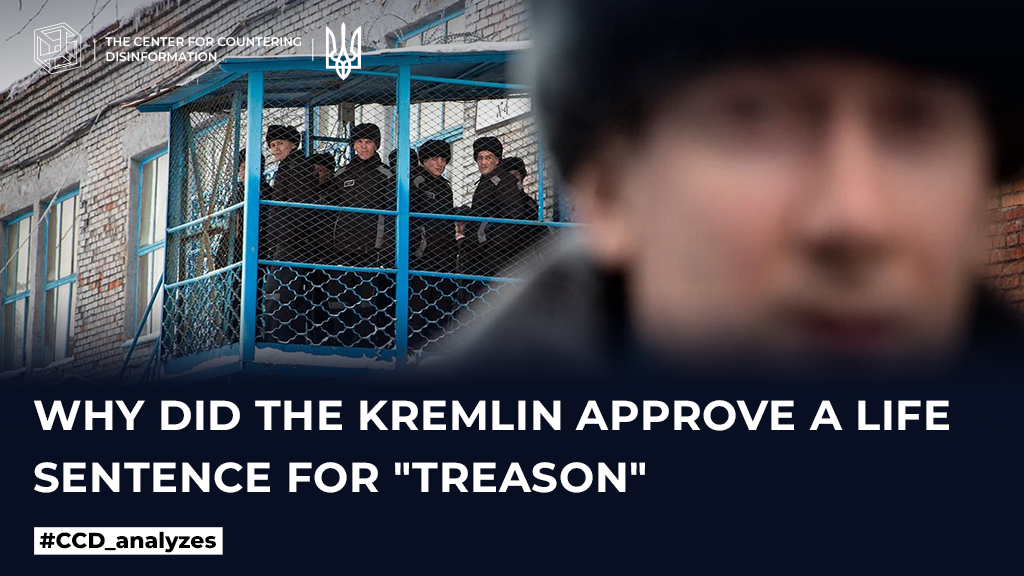On April 26, the federation council of the russian federation approved, and putin signed, a law that increases criminal liability for “treason”, “sabotage” and “terrorism”, and establishes penalties for facilitating the implementation of decisions of international organizations or foreign state bodies in which the russian federation does not participate. In particular, under the article “Treason” the punishment is up to life imprisonment (previously it was up to 20 years), under the article “Terrorist act” the maximum term of punishment has been increased from 15 to 20 years, for committing an act of international terrorism the punishment will be from 12 years to life imprisonment (previously – from 10 years). In addition, the law increases the minimum sentence for involvement in the commission of terrorist crimes from 5 to 7 years, and for participation in a terrorist community, the guilty will face from 10 to 15 years of imprisonment (previously – from 5 to 10 years).
What is behind such legislative initiatives of the kremlin?
By making changes to russian criminal legislation, the kremlin pursues both foreign and domestic goals.
In the foreign policy aspect, the reason for the appearance of the new law on responsibility “for assisting in the implementation of the decisions of international organizations in which the russian federation does not participate, or of foreign state bodies on the criminal prosecution of public authorities of the russian federation” lies in the desire of the authorities to level the significance of the decision of the International Criminal Court, which issued an arrest warrant for putin and the children’s ombudsman in connection with accusations of war crimes. The harshness of the sanctions is aimed at eliminating the motivation of citizens of the russian federation to give evidence to international organizations due to the violation of the rights of Ukrainian children forcibly deported to the russian federation.
In the domestic political aspect, the new interpretation of the concept of “treason” and the life sentence for it are intended to intimidate russians and restrain anti-war and anti-state sentiments. It is not for nothing that the number of verdicts in such cases increased significantly precisely after the start of military aggression against Ukraine. Since the beginning of 2023, at least 20 cases under the article on treason have been initiated in the russian federation, which is 5 times more than during the same period last year. Legislative innovations allow the authorities to interpret this type of crime much more broadly than before, as well as to charge it with any person who does not agree with the kremlin’s policy. The presumption of innocence, for example, is completely excluded from investigations and proceedings in cases under Article 207.3 of the criminal code of the russian federation (spreading knowingly false information), and Article 280.3 (discrediting the russian federation) simply punishes disagreement with the russian authorities. In addition, the maximum threshold of punishment provides for its serving in institutions with a special regime of imprisonment and provides for parole not earlier than after 25 years and on condition of exemplary behavior, that is, it makes it practically impossible. It is not for nothing that the ECtHR equates life imprisonment without the real possibility of reviewing the sentence to torture.
Another reason for increasing the punishment for “treason” is the judicial practice of russian justice, when detainees under this article are encouraged to make a so-called agreement with the investigation – the accused provides “information” about another person who can also be accused of treason. In this way, the government makes it easier for itself to identify the maximum number of citizens who disagree with its decisions.
The vague interpretation of the norms of the articles and the violation of the rights of the accused contradict both the constitution of the russian federation and all the basic principles of international criminal law, but it is widely used in russian courts.
The absence of the need to prove the guilt of the accused in the predominantly fictitious composition of the crime returns modern russian legislation to stalin’s arbitrariness. After all, in those days, opponents of the “party line” admitted under torture to “discrediting the government” and were destroyed as “enemies of the people.”
Therefore, there is every reason to believe that the russian authorities have launched a real hunt for “traitors of the motherland” and will pursue them harder than before. The russian special services demonstrate readiness for increasing criminal prosecutions of political opponents of the kremlin. If 90% of all cases of “treason” and “espionage” were investigated by the investigative department of the central office of the FSS in moscow last year, now the regional department of the FSS has been ordered to initiate such cases.
❗️ Changes in legislation testify to the final degradation of the russian legal system, which accelerated sharply with the beginning of full-scale aggression against Ukraine and the expulsion of the russian federation from the Council of Europe. In such a situation, russians can only hope that even now under the article on “treason” any person who disagrees with the kremlin’s course can be imprisoned for life, but it will last as long as putin remains in power. And this to some extent depends on the position of each russian and the timing of Ukraine’s victory in the war.










